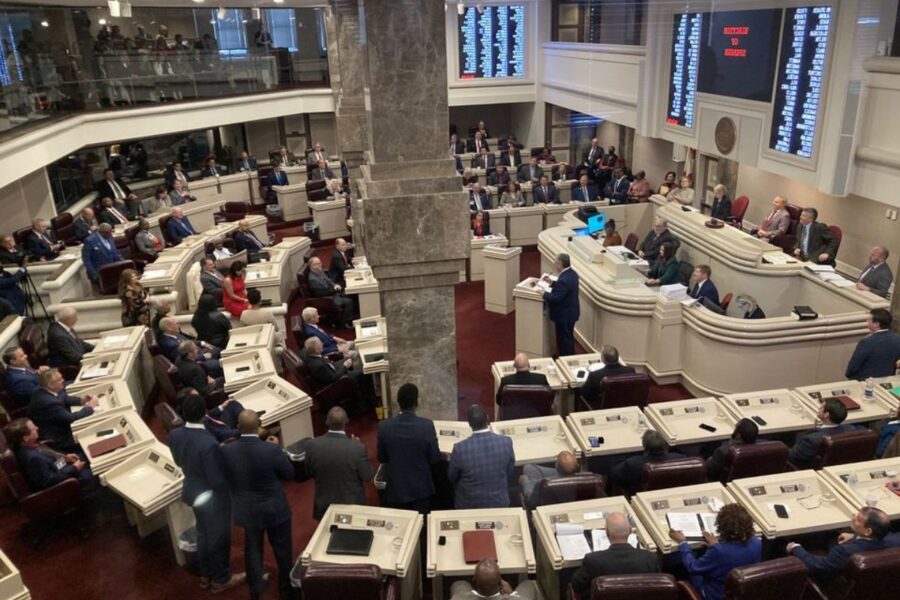Alabama House Bill Seeks Increase Compensation: In a legislative effort to address the compensation levels of school board members, Alabama House Bill 57 seeks to increase their remuneration. The proposed bill aims to elevate the compensation for these individuals while also introducing educational requirements.
However, the path towards implementing these changes faces potential delays and uncertainties. This article will explore the evolution of HB 57, including the concerns that have been raised and the perspectives of various stakeholders, such as the Alabama Association of School Boards (AASB).
As the legislative session approaches, the future of HB 57 remains uncertain, leaving both proponents and opponents of the bill eagerly awaiting its outcome.
Key Takeaways
- Alabama House Bill 57 aims to raise the maximum monthly payment for school board members from $600 to $900.
- Representative Tracy Estes argues that school board positions require a significant time commitment.
- The bill includes educational requirements for school board members, such as specific continuing education training on school finance, leadership development, and educational policy and governance.
- Concerns about conflicts of interest related to minimum payments have been addressed by removing the contentious language from the bill, and the Alabama Association of School Boards plans to introduce a separate bill to address conflicts of interest among board members.
Legislative Effort to Boost School Board Member Compensation Faces Potential Delay
The legislative effort to enhance compensation for school board members in Alabama is currently facing a potential delay. Representative Tracy Estes, the bill sponsor, is working to eliminate language related to minimum payments in House Bill 57, which aims to raise the maximum monthly payment for school board members from $600 to $900.
Estes, a former school board member himself, argues that these positions require a significant time commitment and believes that updating the compensation structure will attract more qualified candidates. However, the removal of the language related to minimum payments could complicate the passage of the bill, potentially delaying its implementation.
It remains to be seen how this setback will impact the overall progress of the legislative effort to increase compensation for school board members in Alabama.
House Bill 57: Elevating Compensation with Educational Requirements
House Bill 57 introduces educational requirements in conjunction with elevating compensation for school board members in Alabama. Under this bill, board members would be required to undergo specific continuing education training to qualify for the increased payment. This move aims to ensure that board members are equipped with the necessary knowledge and skills to effectively carry out their responsibilities.
By linking compensation to educational requirements, the bill seeks to incentivize professional development and continuous learning among board members. The table below provides an overview of the proposed educational requirements and the corresponding increase in compensation:
| Educational Requirement | Increase in Compensation |
|---|---|
| Completion of training on school finance and budgeting | 10% |
| Participation in leadership development programs | 15% |
| Completion of courses on educational policy and governance | 20% |
These requirements encourage board members to enhance their understanding of key areas related to school governance and administration, ultimately benefiting the education system in Alabama.

ALSO READ: Thousands Sign Petition Against Surge in Power Bills
Evolution of HB 57: Concerns Regarding Minimum Payments Addressed
Concerns regarding the minimum payments for school board members outlined in House Bill 57 have been addressed following feedback from the Alabama Association of School Boards (AASB).
Originally, the bill included a provision stating that board members were entitled to a minimum of $50 per month. However, the AASB raised concerns about potential conflicts of interest, prompting a reevaluation of the language.
Sally Smith, the executive director of AASB, explained that the minimum payment clause was added after a mayor expressed interest in joining a school board.
To address these concerns, the bill will be refiled without the contentious language, ensuring that potential conflicts of interest are appropriately considered.
This revision demonstrates a commitment to transparency and the avoidance of conflicts within the school board system.
AASB’s Perspective: Reservations and Future Plans
Following the reevaluation of the minimum payment provision in House Bill 57, the Alabama Association of School Boards (AASB) has expressed reservations and outlined their future plans regarding potential conflicts of interest among school board members.
Sally Smith, representing the AASB, acknowledges the importance of addressing conflicts of interest and expresses concerns about the current minimum payment provision.
To address these concerns, the AASB plans to introduce a separate bill in the future that specifically outlines the boards on which school board members cannot serve due to conflicts of interest. This targeted approach aims to avoid unintended consequences and will be proposed in a subsequent legislative session.
Future of HB 57: Legislative Session Approaches with Uncertain Outcome
The fate of HB 57 in the upcoming legislative session remains uncertain as stakeholders work to address concerns and refine the legislation. Rep. Tracy Estes, the sponsor of the bill, along with the Alabama Association of School Boards (AASB), is actively involved in ensuring that the bill effectively addresses compensation issues for school board members without unintended complications.
One of the concerns surrounding HB 57 is the issue of minimum payments. Critics argue that setting a minimum payment could lead to unnecessary financial burden on smaller school districts. Additionally, there are concerns about potential conflicts of interest that may arise if school board members receive increased compensation.
The table below highlights the key stakeholders involved in the discussion surrounding HB 57 and their respective viewpoints:
| Stakeholder | Viewpoint |
|---|---|
| Rep. Tracy Estes | Supports increasing compensation to attract qualified candidates |
| AASB | Advocates for fair compensation but seeks to address concerns and refine the bill |
| Critics | Concerned about potential financial burden on smaller school districts and conflicts of interest |
As the legislative session approaches, it remains to be seen how these concerns will be addressed and whether HB 57 will ultimately pass.
Conclusion Of Alabama House Bill Seeks Increase Compensation
Alabama House Bill 57 aims to increase compensation for school board members while also introducing educational requirements. Despite concerns regarding minimum payments, the bill has evolved to address these issues.
The Alabama Association of School Boards has expressed reservations about the bill and is considering future plans. As the legislative session approaches with an uncertain outcome, the future of HB 57 remains to be seen.

